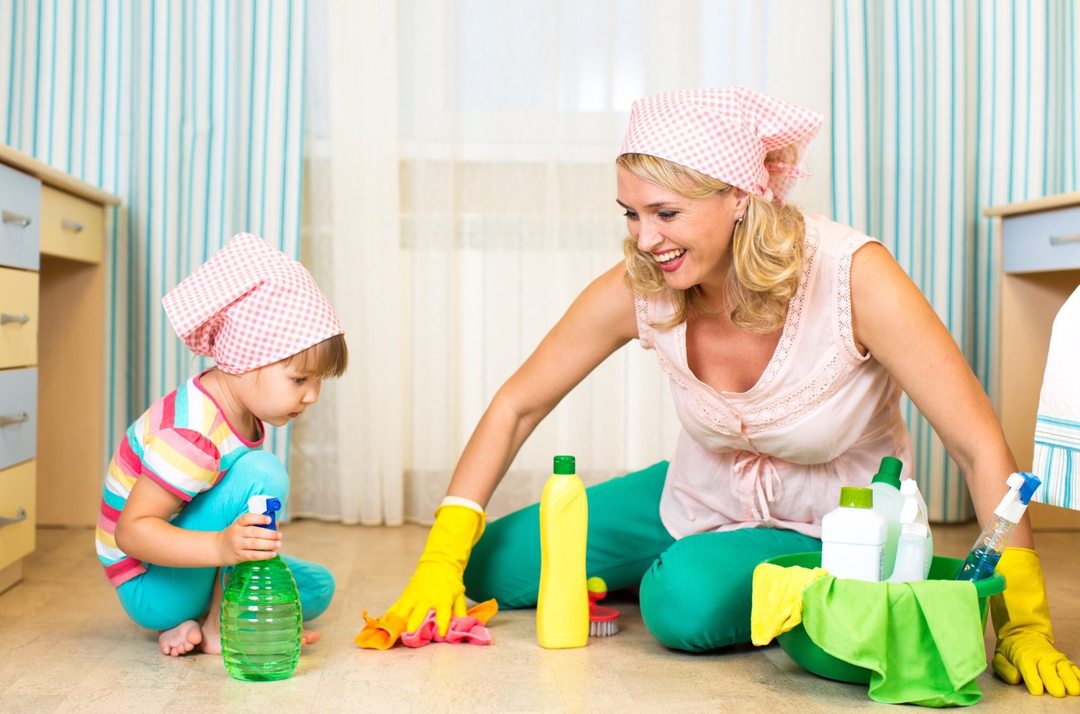Life is so arranged that it is impossible to do without cleaning! Drank coffee - you need to wash the cup, put on a T-shirt - it needs washing. Of course, there are individuals who are able to pour compote into a mug with the remains of kefir, and then brew tea in the same dirty mug. But even such "do not care" sometimes have to do the cleaning.

Everyone cleans up the trash in their home, but not everyone does it the same way. For some, this is a superficial erasure of dust and dirt, for others - the desire to bring everything to the sterility of the operating room. How should you feel about putting things in order? Let's figure it out together.
"Clean" - praise for the hostess?
The content of the article
-
"Clean" - praise for the hostess?
- Check yourself!
-
If order becomes an obsession
- Excessive pursuit of purity becomes a neurosis
- Who is threatened by the neurosis of purity?
-
Cleanliness is important, but not above all else!
- How to get rid of addiction before cleaning
In our country, when they want to praise the hostess, they say “cooks deliciously”, “hospitable”, “neat”. These are really good compliments. But who knows what kind of work and what sacrifices lie behind the desire to always "conform"?

Important! If cleaning is perceived as easy, then everything is fine. But if she becomes the meaning of life, if all her free time is given only to her, then there is reason to think.
Check yourself!
What is the first thing to think about? Psychologists suggest giving an honest answer to a few simple questions:
- Why is it necessary to constantly wash something?
- Who is cleanliness for?
It's okay if the question is "why" you answer something like this:
- households are allergic to house dust;
- relatives and strangers come to the house without warning;
- hate mess.
The answers to the question “for whom»:
- for yourself, husband, parents;
- I want to be an example for children;
- I do not want to look sloppy in the eyes of strangers.
Important! If you chose the last answer twice, you are close to a "purity neurosis." It's time to reconsider your attitude to order!

That constant cleaning has become a psychological problem, signal the following responses:
- "Do not know";
- "So it should be";
- "On Saturdays, there must be a general cleaning."
Important! The schedule itself is a great discipline thing. But is it necessary to sacrifice family vacations for the sake of keeping the tradition? It is unlikely that anyone will appreciate such a sacrifice.
If order becomes an obsession
How to understand that the order has become an idefix? The signs are simple:
- the hostess moves around the house with a rag in her hands;
- she cannot be taken by surprise;
- she has everything laid out on the shelves, nothing is lying around, even the mugs in the closet are with handles in one direction!
From the outside it may even seem that no one lives in the house. Is it good or bad?
Excessive pursuit of purity becomes a neurosis
It is “good” if family members support the pursuit of cleanliness and are actively involved in the cleaning process. It is "bad" if the family has to look for a "fifth corner" to do their own thing.

Advice! Try to hear yourself “from the outside”: “don't sit on the sofa - you remember; don’t walk on the carpet - you’ll get dirty ”! If it sounds like this all the time, congratulate yourself on the neurosis of purity.
Are there other symptoms of a neurotic condition associated with maintaining order? Yes there is.
The neurosis is evidenced by:
- the inability to stop the process of putting things in order;
- the desire to wash the home to shine by the morning rise of the husband and children;
- endless hand washing;
- anxiety that there is an unnoticed speck somewhere;
- disdainful attitude towards someone else's premises;
- a desire to polish outside of your own home.
Important! Neurosis is a serious problem, misunderstanding of which "pours out" in different forms, sometimes in a manic striving for purity.
Who is threatened by the neurosis of purity?
Important! Experts believe that those who are not able to "put in order" their own thoughts are struggling with non-existent dirt "by all means".

They need physical activity because it provides at least temporary emotional relief.
Who is most susceptible to neurosis? It usually occurs in people belonging to one of these groups:
- People, grew up in a dysfunctional family. They are trying to assemble life like a mosaic of shapeless debris. Purity, then, is an illusion of control over life.
- Those, who has experienced betrayal or deception. The inability to express negative emotions leads to the cleaning up of mythical pollution.
- Victims of violence. They not only clean up around them, but also try to wash off imaginary dirt from themselves, sometimes rubbing the skin to blood.
- Avid collectorswho are usually pedants.
There is another manifestation of the disorder: everything around it seems dirty and contagious. People are afraid of being infected by touch. For them, the handle of the front door to the office is a breeding ground for pathogens. They can hardly restrain their disgust when it is necessary to transfer something, to take papers and documents from someone.
Familiar feelings? So, you should take care of yourself!
Cleanliness is important, but not above all else!
The love of order is a commendable quality. But in striving for accuracy, it is important not to overdo it, otherwise life will turn into a fight with virtual dirt.

It is important not to miss the moment when it’s time to say “stop” to yourself, so that there is no risk of losing peace, friends, sacrificing rest and entertainment. In addition, being in the same space with a cleanliness can cause trouble for others. Loved ones are anxious about what they will "inherit" somewhere. Children, on the other hand, are generally sure that any of their games is a disaster for their mother.
How to get rid of addiction before cleaning
Have you found yourself at risk? Don't wait for neurosis!
- Can go to a psychologist. He will play several situations in which you need to make a choice between order and salvation, for example, in an extreme situation.
- Turn to wise thoughts. For example, to such: "Everything passes, and it will pass."
- See life as a game in which all actions are regulated.
Advice! If an hour and a half a day is allotted for cleaning, then after the agreed time, all cleaning equipment should be postponed until tomorrow.
It is advisable to remember that any order must sometimes be violated. Otherwise, there will be nothing to clean! And further: society values not clean rooms most of all, but pure thoughts.


